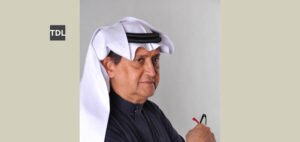The prominent procurement leaders of the Middle East manage demand, negotiate contracts, and build supplier relations. They add value to the supply chain by collaborating, innovating, and saving costs, while also focusing on sustainability and risk mitigation. These leaders develop and implement procurement strategies while identifying opportunities for cost reduction and driving innovation.
The pioneers of the procurement industry leave no stone unturned to ensure smooth workflow. Their primary focus is always on delivering seamless services to their clients. They are game changers in this ever-evolving industry.
A distinguished name in the field procurement is Khalid Al Barwani, the Head of Contracts- IT & Digitalization Services at Petroleum Development Oman (PDO). He has built an illustrious career rooted in economic principles and strategic supply chain management. His journey began with a bachelor’s degree in Economics from Cardiff University, where he cultivated a deep understanding of resource allocation and business operations. This academic foundation led him to recognize the critical role that procurement and contract management play in driving organizational success.
With procurement accounting for nearly 80% of an organization’s spending, Khalid was drawn to a field where he could directly impact corporate performance. To strengthen his expertise, he pursued a Master’s degree in Operations and Supply Chain Management, equipping himself with the necessary tools to navigate complex contracting and procurement processes. Over the years, he has held multiple roles at PDO, including Contract Engineer, Procurement Analyst, and Senior Business Improvement Specialist. These experiences have provided him with a comprehensive understanding of procurement and contract lifecycles, as well as the strategic levers necessary to optimize efficiency and value.
What makes contract management particularly exciting for Khalid is its dynamic and ever-evolving nature. Every day presents new challenges and opportunities to innovate, refine processes, and drive meaningful outcomes. His role not only involves overseeing contracts but also influencing strategic projects, such as Contractor HSE Management, that shape PDO’s long-term success in the oil and gas sector.
Key Priorities for 2025: Optimizing Contracts and Enhancing Efficiency
As he steps into his leadership role as Head of IT & Digitalization Services (Contracts), Khalid is focused on streamlining sourcing cycles to unlock greater efficiency and enhance operational agility. In a high-stakes industry like oil and gas, time-sensitive contracts are crucial in ensuring smooth project execution and maximizing monetization opportunities. His approach includes implementing lean principles to eliminate inefficiencies, frontloading key activities, and improving stakeholder collaboration.
A major priority for Khalid is the rationalization of PDO’s extensive IT contract portfolio. With numerous contracts in place, there is a significant opportunity to consolidate agreements, optimize pricing, and reduce administrative burdens. By strategically bundling contracts, PDO can leverage economies of scale and focus resources on contracts that drive maximum business value. His objective is not just to manage contracts efficiently but to transform them into strategic assets that contribute to PDO’s overall performance.
By combining process innovation with effective contract management strategies, Khalid aims to create a procurement ecosystem that is agile, cost-effective, and aligned with business goals. His vision extends beyond operational efficiency—he is committed to fostering strong partnerships with suppliers and stakeholders to ensure long-term success.
Leadership Approach: Drawing from the Best to Inspire Growth
Khalid’s leadership philosophy is shaped by the influential mentors he has worked with throughout his career. Rather than adhering to a singular leadership style, he believes in incorporating the strengths of various leaders into his own approach. From Masooma Al Lawati’s proactive mindset and organizational excellence, to Vlad Nemes ability to create conditions for success and supportive leadership, and Moosa Al Sharyani’s strategic decision-making and effective stakeholder engagement, Khalid has absorbed valuable insights from his current leadership and industry veterans.
He also draws inspiration from Saif Al Harthi’s analytical thinking and ability to drive impactful change at the executive level. At the MD level, Khalid aligns with Dr. Aflah Al Hadhrami’s people-centric leadership, recognizing that an empowered and motivated workforce is key to achieving long-term success. By blending these diverse leadership qualities, Khalid has crafted a leadership style that is adaptable, results-oriented, and deeply rooted in collaboration.
His approach emphasizes balancing people and processes—ensuring that teams are well-supported while driving efficiency and innovation. He firmly believes that by fostering a positive work environment and encouraging continuous learning, he can cultivate a team that is both high-performing and resilient.
Leveraging Expertise to Drive Contract Innovation
Khalid’s recent participation in the Future Leaders Programme at The Royal Academy of Management has further honed his leadership and strategic capabilities. This prestigious program, established under Royal Decree, aims to nurture the next generation of Omani leaders. His six-month journey through the program included modules on communication, team leadership, and lean thinking.
A highlight of his experience was a visit to Japan, where he studied operational excellence from industry giants like Toyota and Hitachi. The exposure to lean methodologies and cutting-edge business practices has provided Khalid with invaluable insights into optimizing contract management. These lessons are particularly relevant in the oil and gas industry, where efficiency and cost control are paramount.
In his previous role as Senior Business Improvement Specialist, Khalid led critical projects, including Contractor HSE Management. His work in this domain was recognized with the CAE Directorate Gold Award, standing out among 30+ high-impact projects. This achievement underscores his ability to drive meaningful change and implement best practices in procurement and contract management.
A Legacy of Global Recognition and Knowledge Sharing
Among Khalid’s proudest accomplishments is his recognition at international forums. He has received multiple awards across the USA, UAE, Bahrain, and Singapore for his contributions to contracts and supply chain management. These accolades reflect his expertise and commitment to advancing the field on a global scale.
Beyond receiving recognition, Khalid is passionate about knowledge sharing. He has been invited to present at key industry conferences, with upcoming engagements scheduled in the UAE and Australia. His ability to combine academic knowledge with real-world applications makes him a sought-after speaker in the field of contract management.
The Strategic Role of Contracts in Business Success
Contracts are often perceived as legal formalities, but Khalid views them as strategic tools that define business relationships, allocate risks, and drive performance. Well-structured contracts provide clarity, reduce ambiguity, and establish accountability between parties, minimizing disputes and ensuring smooth project execution.
From a corporate perspective, contracts serve as a bridge between operational execution and business objectives. They play a critical role in financial planning, risk mitigation, and supplier management. In an industry as complex as oil and gas, effective contract management is essential for maintaining regulatory compliance, optimizing costs, and fostering long-term partnerships.
By integrating legal safeguards with operational flexibility, Khalid ensures that contracts at PDO are both protective and adaptable. His approach includes incorporating escalation mechanisms, performance-based terms, and renegotiation windows that allow for adjustments in response to market fluctuations. This balance between structure and flexibility enables PDO to navigate uncertainties while maintaining contractual integrity.
Digitalization and AI in Contract Management
The future of contract management lies in digital transformation. Khalid is spearheading initiatives to leverage AI and automation to enhance contract efficiency. Key advancements include:
- Automated contract creation using predefined templates, reducing manual effort and accelerating sourcing cycles.
- Contract lifecycle management (CLM) systems that track milestones, renewals, and obligations, ensuring proactive contract oversight.
- AI-driven risk assessment, allowing for real-time analysis of contractual risks and compliance factors.
At PDO, Khalid is integrating digital tools into procurement workflows, enabling smarter decision-making and improved audit readiness. His vision is to create a contract management system that is not only efficient and accurate but also capable of adapting to the rapidly evolving business landscape.
Future Trends in Contract Management
As industries evolve, contract management is being shaped by several emerging trends:
- AI and Automation – Enhancing contract analytics, risk prediction, and compliance management.
- ESG Compliance – Integrating sustainability and governance considerations into contractual agreements.
- Smart Contracts & Blockchain – Enabling self-executing contracts with transparent and tamper-proof records.
- Data-Driven Risk Management – Utilizing predictive analytics to mitigate potential contractual risks.
- Stronger Cross-Functional Integration – Aligning procurement, legal, and finance teams for holistic contract governance.
Khalid believes that organizations must invest in technology, upskill contract teams, and foster a culture of continuous learning to stay ahead in this evolving landscape. By embracing digitalization and innovation, businesses can transform contract management from an administrative function into a strategic advantage.
Advice for Aspiring Procurement Professionals
For those entering the procurement field and aspiring to climb the ranks, Khalid offers two key pieces of advice:
- Build Strong Relationships – Success in procurement is driven by collaboration. Cultivating trust with suppliers, stakeholders, and internal teams can open doors to new opportunities.
- Stay Curious and Keep Learning – The industry is constantly evolving. Pursuing certifications, attending industry events, and staying updated on market trends will set professionals apart.
Khalid’s career is a testament to the power of strategic contract management. By blending expertise, innovation, and leadership, he is shaping the future of procurement and contract management in Oman’s oil and gas sector.
Read more: Michael Gale: From Silicon Valley to Global Entrepreneurial Leader





